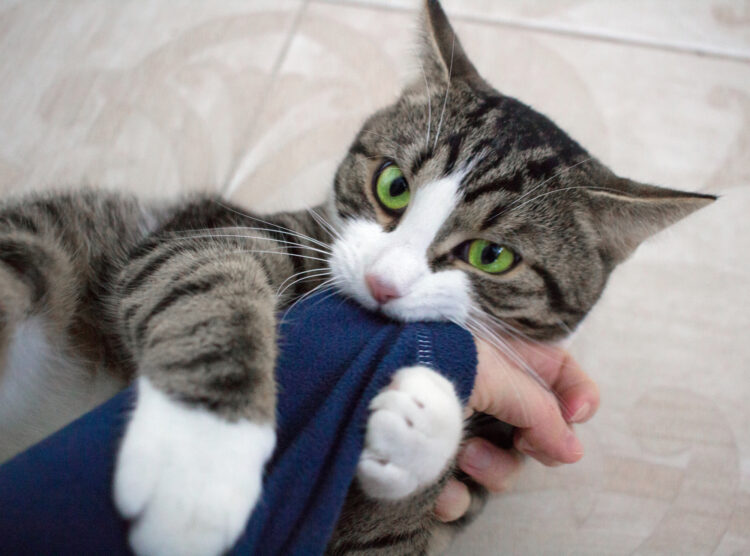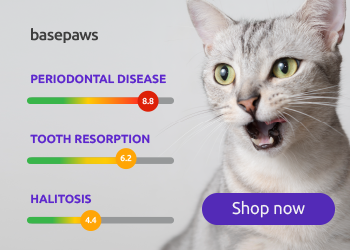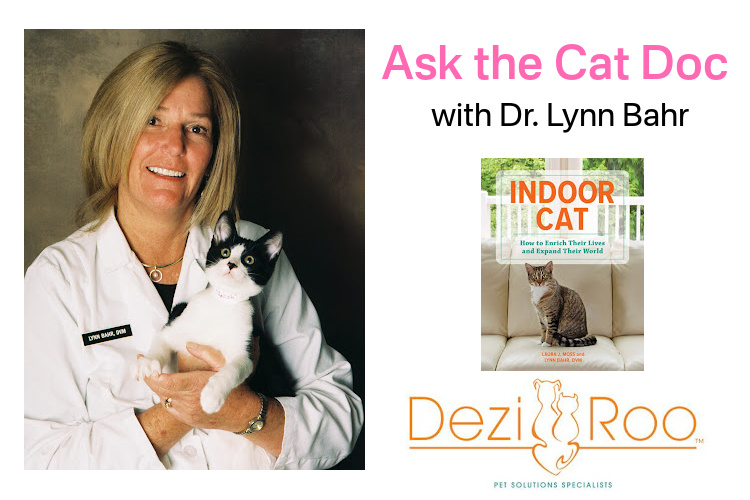
It can happen even with the most laid back cat: an overexcited cat bites her human during play, or while accepting a treat. In more extreme cases, redirected aggression can cause a cat to lash out at the humans in the household and cause severe damage. And of course, most of us will pet stray cats we meet along the way, but not all seemingly friendly cats remain friendly after being approached by strangers. Regardless of how a cat bite happens, it is not something to take lightly.
Understanding the anatomy of a cat bite
Cat bites only account for 5 to 15% of animal bites reported by emergency rooms, but they pose a much greater risk of infection. Unlike other animal bites, which can tear flesh and even break bones, but are easier to clean, cat bites create narrow, deep puncture wounds due to cats’ long, sharp teeth, which are designed to tear through their prey. These teeth can easily penetrate the skin and underlying tissues, injecting bacteria deep into the wound. Additionally, cats’ mouths carry a large number of bacteria which can cause serious infections in bite wounds. One of the more common is a highly pathogenic bacterium known as Pasteurella multocida.
Common complications and infections caused by cat bites
Cat bites can lead to various complications and infections, some of which can be severe if left untreated. Symptoms of infection include redness, swelling, pain, and pus formation at the site of the bite. Another potential complication is cellulitis, which is a bacterial infection of the skin and underlying tissues. Cellulitis can cause warmth, redness, swelling, and tenderness in the affected area.
Bites to the hand and fingers can be particularly dangerous. A Mayo Clinic study found that 1 in 3 patients with cat bite wounds on the hand had to be hospitalized, and two thirds of those hospitalized needed surgery. Out of 193 cat bite victims, 36 were immediately admitted to the hospital, where they stayed an average of three days. Another 154 were treated with oral antibiotics as outpatients, although 21 of them eventually had to be hospitalized. Complications included nerve involvement, abscesses and loss of joint mobility.
What to do immediately after a cat bite
Immediately wash the wound under running water. If the wound is bleeding, don’t stop blood flow; in fact, try to encourage bleeding by gently pressing the area around the wound. Bleeding may help flush out any bacteria that may have gotten into the wound. Don’t use harsh disinfectants or chemicals to clean the wound, as they may harm tissue and slow down healing. Arnica, a homeopathic remedy, can help prevent bruising, and Ledum can help prevent infection.
Seek medical attention as soon as possible
While some cat bites may heal without causing infection, it is recommended that you seek medical attention for all cat bites. A serious infection can develop 24-48 hours after being bitten.
If the wound is deep and severe and may have damaged underlying tendons or tissue, or if blood spurts from the wound and bleeding can’t be stopped, go to the nearest ER.
Recognizing the signs of infection after a cat bite
If you decide to delay medical care, it is crucial to be able to recognize the signs of infection. Common signs of infection include increased pain, redness, swelling, and warmth around the bite wound. The wound may also start to discharge pus, and you may experience a fever or chills. If you notice any of these symptoms, it is essential to seek medical attention promptly. Since infections from cat bites can progress rapidly, early intervention is critical to prevent further complications.
Treating minor cat bites at home
For minor cat bites that do not require medical attention, there are steps you can take to promote healing at home. After cleaning the wound, apply an over-the-counter antibiotic ointment to prevent infection. Bite wounds usually heal quicker if left uncovered, but make sure you keep the wound clean. Monitor for signs of infection and contact your doctor or go to your nearest urgent care if any appear.
Cat bites are reportable
In many jurisdictions, your physician will be required to file a report with the local health department. In almost all states, a cat that has bitten a human or another domestic animal must undergo a mandatory 10-day rabies quarantine period, typically carried out in the cat’s home. However, some states may require that this quarantine will be carried out in an approved animal control facility. If the cat is healthy after 10 days, there is no risk to the person who was bitten.
How to prevent cat bites
Do not allow kittens and young cats to play with your hands. While the kitten grabbing at your hand and biting your fingers may be adorable, it won’t be so adorable anymore when he has grown into an adult cat. Use interactive toys to play with your cat instead.
Never try to separate cats who are fighting. If your cats get into a serious scuffle, use a blanket or sturdy piece of cardboard to try to separate them. Give them time to calm down before approaching them.
Image Depositphotos
The information shared in this article is not a substitute for medical care.








I raised many kittens and did play with them with my hands. When they are small it feels like little pin pricks. To stop this biting behavior I would hold their chin with the hand they were biting. They don’t like that and soon release. The same when they kicked with their feet. I would hold their feet. They didn’t like that either. Doing this made them play without biting and using their claws. Which made them excellent pets to go to their new homes. Yes, when they get bigger they can have a terrific bite and the swift move of an open claw can lacerate your unprotected body parts.
Never heard of Ledum before. I looked on Amazon and it comes in tablets and there was one ointment. I would think the ointment would be the obvious choice. Good to know.
Actually, the pellets would be the better choice, Theresa https://amzn.to/3OMedji
Thanks for this information. I am usually the one who waits and sees what happens before seeking help. Luckily all bites or scratches I have had haven been minor.
As long as you know what to look for, waiting is probably okay.
I ended up in the hospital twice with cat bites. Be careful .